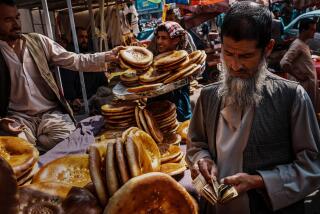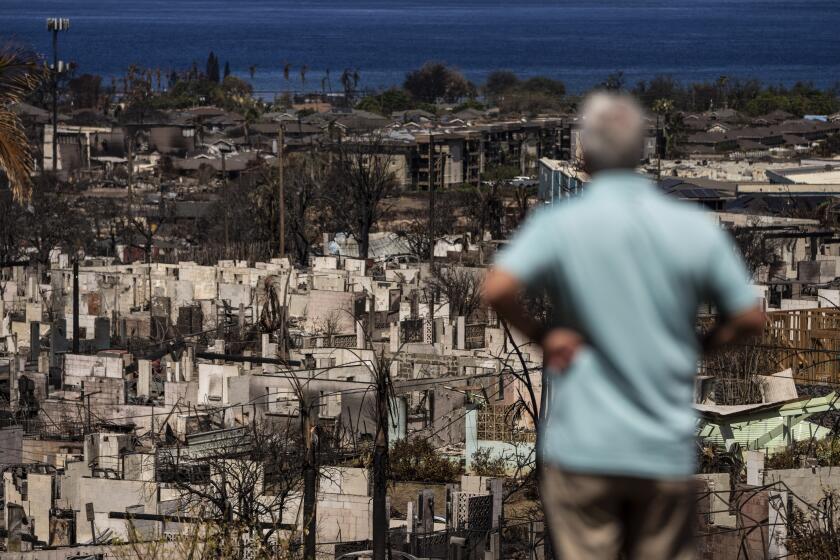Israeli Army Kills 3 After Palestinians Redirect Anger
Stepping back from the internecine violence that erupted Friday in Gaza and raised the specter of a Palestinian civil war, Palestinian protesters trained their fury on a safer target Saturday--the Israeli army.
In East Jerusalem and across the West Bank, Israeli police and soldiers clashed with Palestinian demonstrators, shooting two dead and wounding at least seven.
In the Gaza Strip, Israeli soldiers withdrew from a checkpoint near Netzarim, an isolated Jewish settlement, after hundreds of Palestinians began throwing stones at them. As the soldiers withdrew, demonstrators pursued them. The soldiers opened fire, killing one 17-year-old Palestinian, according to an Israeli army statement.
Palestinians raised a flag at the post before Palestinian police managed to restore order, and three Israeli border policemen were slightly injured, the army said.
Another soldier was fatally wounded in a drive-by shooting at the checkpoint.
Palestine Liberation Organization Chairman Yasser Arafat--who helped broker a truce with his Islamic fundamentalist foes--may have found slight comfort in the fact that it was Israelis clashing with Palestinians on Saturday and not the Arab-on-Arab violence that killed at least 13 people Friday. But there was little else to encourage him.
In demonstrations from the West Bank town of Hebron to Gaza City, thousands of Palestinians cursed Arafat as a traitor, burned his picture and mourned the Palestinians who were killed in clashes with Arafat’s security forces Friday.
General strikes were observed in the territories--even in Gaza and the West Bank town of Jericho, where the self-governing authority that Arafat heads is in charge. Authorities in both places unsuccessfully urged merchants to keep their shops open.
In the northern West Bank town of Tulkarm, a fierce demonstration ended with two Palestinians killed and at least seven wounded by army gunfire.
Few seemed mollified by the Palestinian Authority’s decision, issued Saturday, to form a judicial commission of inquiry and a fact-finding commission to look into the events leading up to the clash that erupted Friday between Palestinian police and followers of the militant Islamic movements Hamas and Islamic Jihad outside a Gaza mosque.
Palestinian intellectuals issued dire predictions that civil war may still erupt. They blamed the strife on Arafat, along with Israel, the United States and nations that have promised to contribute financial aid to the Palestinians but have not delivered.
“These incidents that occurred on Friday broke a taboo,” said Ziad abu Amr, a professor of political science at Birzeit University in the West Bank. “It reminds me of how things first started in Algeria,” where the government’s war with Islamic militants has claimed thousands of lives.
“The blame lies with the Palestinian Authority, which should have foreseen this moment and prepared for it,” Amr said.
“One has to take serious steps that will deal with the causes, not just the symptoms,” said Hanan Mikhail-Ashrawi, a former peace negotiator for the Palestinians. Mikhail-Ashrawi now heads an independent Palestinian human rights organization formed to act as a watchdog over the Palestinian self-governing authority.
“Things could have degenerated into a civil war yesterday,” Mikhail-Ashrawi said in an interview Saturday. “I’m glad that now there is no immediate violence (between the Palestinian Authority and Palestinian militants). But that doesn’t mean that there has been a miraculous solution found for the problems. The detonator was there yesterday, and we haven’t completely removed the explosives.”
Mikhail-Ashrawi blamed Israel for pressuring Arafat to crack down on Islamic militants after both Hamas and Islamic Jihad carried out a series of bloody attacks on Israelis in the last two months.
“The whole attitude of Israel is patronizing,” Mikhail-Ashrawi said.
Israeli Environment Minister Yossi Sarid, who is involved in negotiations with Arafat, rejected any blame for Israel in Friday’s events.
“We don’t want to see them in a state of civil war,” Sarid said Saturday. “We wish them peace and tranquillity. We put pressure on Yasser Arafat to fight terror and terrorists, and this is the only target we ask him to fight. We are not pleased with the unfortunate and tragic event that occurred yesterday.”
Uri Savir, director general of the Israeli Foreign Ministry, said Saturday that the international community understands now that a state of emergency exists in Gaza.
“There is a growing feeling of a need for an emergency effort toward Gaza,” Savir said. He said that Gaza’s myriad economic problems will be discussed at the end of the month in Brussels, when donor countries meet to study ways of funneling money to the Palestinian Authority.
“In the eyes of many, Gaza has turned into a test for the whole peace process, because there the harshest battle takes place between the forces of compromise and the fundamentalists,” Savir said. “We must make an effort to strengthen Arafat.”
Members of Hamas and Islamic Jihad claimed that 13 Palestinians were killed Friday and more than 200 were injured in skirmishes that began outside Gaza’s largest mosque and spread to the streets.
The Palestinian Health Ministry issued a statement Saturday saying that 13 people were killed and 129 were injured. By Saturday night, however, unofficial Palestinian sources were putting the number of dead at 18, saying five died overnight of wounds sustained Friday.
A hastily formed reconciliation committee, which included leaders of the Israeli Arab community, managed to work out a truce between the Palestinian Authority and Hamas late Friday night that held throughout the day Saturday.
The Palestinian Authority honored a commitment to keep police away from the eight funerals in Gaza to bury some of those killed Friday. Police also stayed away when an estimated 2,000 Hamas supporters marched through Gaza City, protesting what they called a “massacre” and denouncing Arafat.
But the Palestinian Authority made no apologies for the conduct of its security services.
“Hamas and Jihad deliberately crossed the red line today,” said a leaflet issued by Arafat’s Fatah faction, the largest Palestinian group represented in the self-governing authority. “We in Fatah affirm that enough is enough. We declare unequivocally that we won’t stand and watch but will know how to confront all forms of political rowdiness and external agents.”
Hamas leaders, however, placed the blame squarely on Arafat’s shoulders and said it is up to him to make amends.
“The whole event (of Palestinian police opening fire on demonstrators) was planned in advance,” Hamas spokesman Mahmoud Zahhar insisted in an interview Saturday night on Israel Television. “Arafat bears personal responsibility until he identifies the real killers and puts them on trial, so that we can understand how . . . Palestinians could kill other Palestinians in such a barbaric manner.”
More to Read
Start your day right
Sign up for Essential California for news, features and recommendations from the L.A. Times and beyond in your inbox six days a week.
You may occasionally receive promotional content from the Los Angeles Times.






